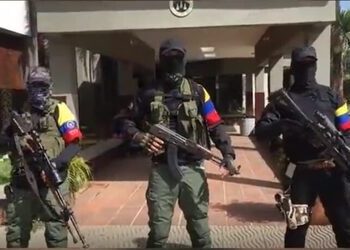A series of videos showing ex-FARC dissidents patrolling the streets of a Colombian town close to the Venezuelan border show how the group has taken advantage of a weakening state presence in a region coveted by criminal actors.
Videos circulated on social media between July 14 and 16 showed armed members of a branch of the ex-FARC Mafia, known as the 33rd Front, carrying heavy weapons and wandering the streets of Tibú, a municipality in the northeastern Norte de Santander department – a crucial hub of coca cultivation.
In the videos, the masked dissidents can be seen questioning civilians and stopping vehicles as they move through the town’s streets.
One video showed the FARC dissidents in front of the mayor’s office in Tibú. The leader of the group addressed the local population, saying they were establishing a presence in the area to offer protection.
“Today we are in the center of Tibú, providing security to all the people…We are the special urban combat forces of the FARC-EP’s 33rd Front,” said one of the dissidents.
SEE ALSO: Coverage of Organized Crime in Colombia
Earlier in July, the same group of dissidents was filmed visiting bars and nightclubs in the town, telling civilians they were providing security in the area.
The presence of the ex-FARC Mafia in Tibú dates back to 2018, following the signing of a peace agreement between the Revolutionary Armed Forces of Colombia (Fuerzas Armadas Revolucionarias de Colombia – FARC) and the national government. The 33rd Front – one of the many ex-FARC factions not to obey the peace agreement – primarily operates in rural parts of the municipality, where it grows coca and processes cocaine in laboratories to finance its continuing conflict against the state.
The ex-FARC dissidents are not the only guerrilla group to have recently walked the streets of Tibú unchallenged. At the start of July, members of the National Liberation Army (Ejército de Liberación Nacional – ELN) went to an urban area in the municipality to attend the burial of a member killed while fighting the Colombian army.
Other armed groups have also sought control of Tibú and the surrounding region, including the Urabeños and the People’s Liberation Army (Ejército Popular de Liberación – EPL).
InSight Crime Analysis
Though the videos posted on social media offer a glimpse into the FARC dissidents’ authority in Tibú, these daytime patrols are not the group’s only means of exerting social control.
Sources in Tibú told InSight Crime the ex-FARC patrols have been frequent since the end of 2021. But in recent months, there have also been several cases of 33rd Front dissidents punishing alleged thieves and drug dealers. Punishments have ranged from public humiliation to death.
SEE ALSO: Is Colombia’s Military Deployment Playing into FARC Dissidents’ Hands?
These forms of social control are not new to Tibú or its surroundings. Armed groups, including the now-demobilized FARC, have long sought to stamp their authority on communities in Norte de Santander, and have attempted to resolve disputes and maintain order.
These most recent examples may stem from an attempt by armed groups to improve their relationship with the local civilian population and avoid animosity.
These groups are growing both economically and militarily, exploiting criminal economies in Tibú and the wider region, such as drug routes to Venezuela and swaths of coca crops.

